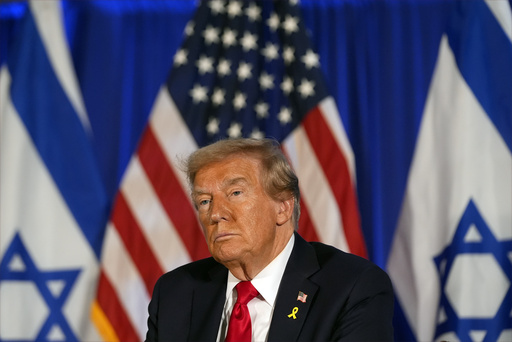
WASHINGTON — As Election Day approaches in two weeks, the ongoing crisis in the Middle East has become a prominent issue influencing the presidential race. One candidate is struggling to articulate a balanced stance, while the other is making assertive claims that the longstanding conflict can be quickly resolved.
Vice President Kamala Harris is attempting to navigate the complexities of U.S. support for Israel while also condemning the civilian casualties affecting Palestinians amidst Hamas’ military actions in Gaza and Hezbollah’s activities in Lebanon. Her efforts have been met with mixed reactions, reflecting the nuanced challenges of addressing such a volatile subject in the political arena.
Former President Donald Trump claims that such events would not have transpired had he been in office, asserting that he could swiftly resolve the tensions if he returned to the presidency. Both candidates are competing for the votes of Arab and Muslim American constituents as well as Jewish voters, with critical races in swing states like Michigan and Pennsylvania.
Recently, Harris’s remarks about a pro-Palestinian protester sparked debate, as her acknowledgement of the protester’s “real” concerns was interpreted by some as an endorsement of notions that Israel’s actions amount to genocide. This interpretation faced backlash from figures such as Michael Oren, former Israeli ambassador to the U.S. Nonetheless, Harris’s team clarified that her comments were intended to highlight the plight of civilians in Gaza rather than label Israel’s conduct.
In a previous statement, Harris emphasized that the tragic narrative of the conflict began with the October 7 Hamas attack that resulted in approximately 1,200 Israeli deaths. This comment was perceived as inadequately recognizing the casualties suffered by Palestinians, where over 41,000 have reportedly died as a consequence of the conflict.
Trump, on the other hand, has conveyed promises of peace in recent interviews with Arab media outlets, suggesting that positive outcomes are imminent in Lebanon under his leadership. He maintained that a future marked by Harris’s potential presidency would worsen the situation in the Middle East. “If Kamala gets four more years, the Middle East will spend the next four decades going up in flames,” he stated, urging voters to support him for the sake of peace.
Harris finds herself in a challenging position as her role as vice president ties her closely to President Joe Biden’s foreign policy decisions. Her attempts to express empathy to all parties involved are bolstered by support from aides and allies who believe Trump’s erratic foreign policy statements are not undergoing sufficient scrutiny.
James Zogby, the founder of the Arab American Institute and a Harris supporter, described the campaign’s contrasting styles, noting the struggle her careful approach faces against Trump’s more theatrical tactics. He expressed concerns that the lack of immediate results from Harris’s cautious diplomacy might play against her in the final stretch of the campaign.
The evolving political landscape could have significant repercussions post-Election Day, especially as regional powers, particularly Israeli Prime Minister Benjamin Netanyahu, closely monitor the electoral results with the potential for shifts in U.S. foreign policy.
Recent polling data shows no clear advantage for either Trump or Harris concerning the Middle East situation. Approximately 40% of registered voters believe Trump would manage the issue better, while a similar number feel the same about Harris. Around 20% believe neither candidate would be effective in this area.
Harris faces signs of vulnerability within her own party, as only about two-thirds of Democratic voters view her as the more capable candidate regarding Middle Eastern affairs. In contrast, approximately 80% of Republican voters favor Trump’s approach.
The Israel-Hamas war profoundly affects the Arab American community in Michigan, which has the largest such concentration in the U.S. Many in the community have family ties to Lebanon and Gaza, and recent tragedies, such as the death of Kamel Ahmad Jawad, a local resident who died while delivering aid, have intensified feelings of anger and calls for a ceasefire and an arms embargo on Israel.
Although mainstream political parties have generally presented a united front in support of Israel, much of the criticism has increasingly been directed at Biden. When Harris entered the race, many in the Arab American community felt hopeful due to her previous remarks and early campaign efforts to engage with their concerns. However, this sentiment diminished as they perceived an insufficient distinction between her policies and those of the current administration.
Rima Meroueh, director of the National Network for Arab American Communities, encapsulated the community’s frustration by emphasizing that merely claiming Trump would be worse is disingenuous when families are directly suffering losses.
To amplify their message, Future Coalition PAC, a super PAC backed by Elon Musk, is targeting Arab American communities in Michigan with advertisements that highlight Harris’s support for Israel. They also aim to sway Jewish voters in Pennsylvania by criticizing her stance on weapon sales to Israel as part of their strategy to showcase her alignment with Biden’s approach.
Harris’s spokesperson has framed Trump’s comments about the Middle East as representative of a more chaotic, “go-it-alone” policy approach that could destabilize international relations further.
